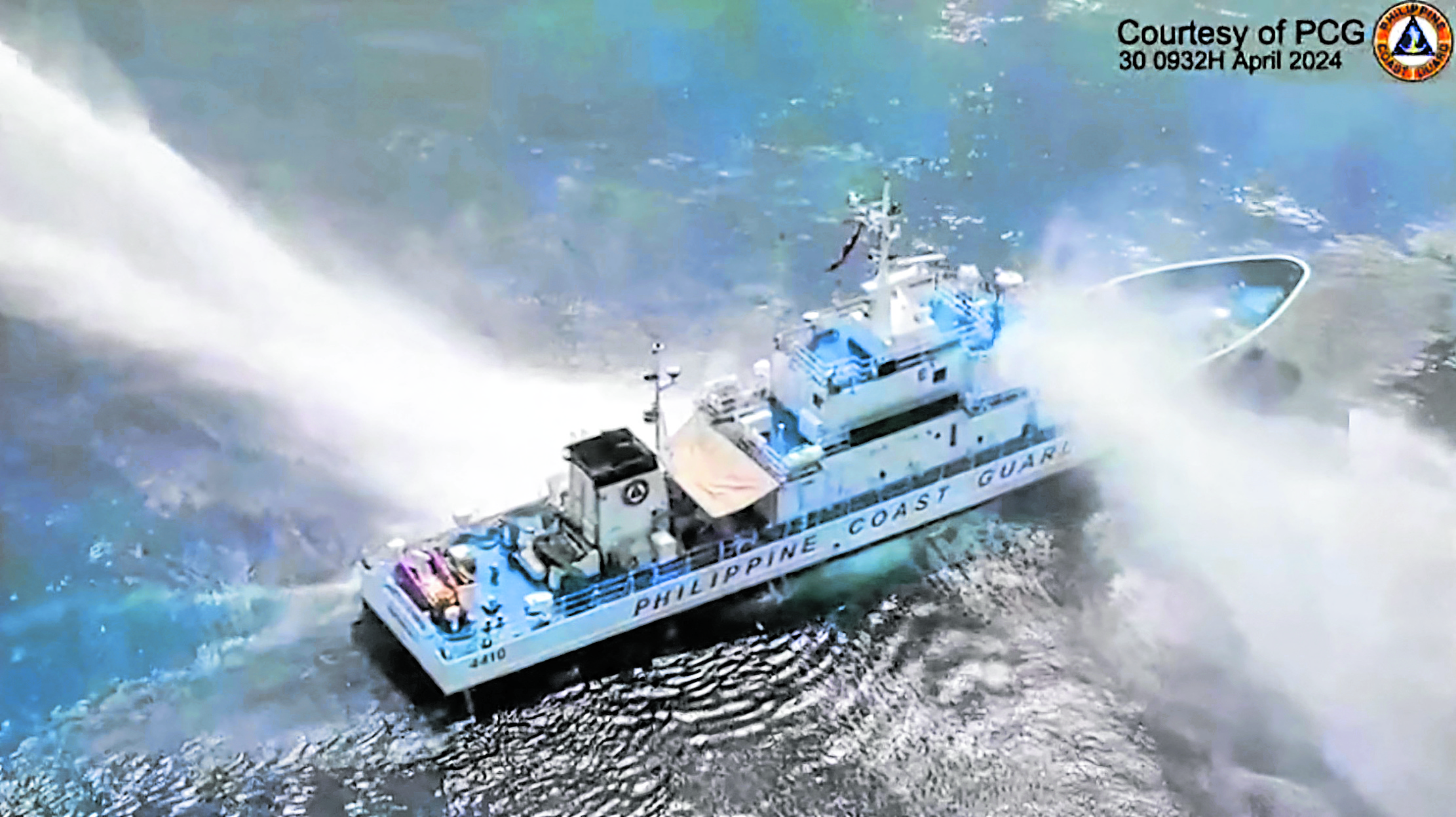
A frame grab from video footage released by the Philippine Coast Guard shows its ship, the BRP Bagacay, being hit by water cannon from Chinese coast guard vessels near the Chinese-controlled Scarborough Shoal in the West Philippine Sea. Also hit on its way to the shoal was the BRP Bankaw of the Bureau of Fisheries and Aquatic Resources. —AFP
SUBIC, Zambales — China’s new policy allowing its coast guard to detain foreigners deemed “illegally crossing” its borders – including those in the Philippine exclusive economic zone (EEZ) – is illegitimate and illegal under international law, experts said on Friday.
A South China Morning Post report said this new rule, which was announced on Thursday, “coincides with the arrival at Scarborough (Panatag) Shoal of a group of civilians and fishermen from the Philippines.”
READ: China empowers self to detain South China Sea ‘trespassers’
This new policy, which outright disregards Manila’s sovereign rights in the West Philippine Sea, will take effect on June 15.
‘No ounce of legitimacy’
An international studies expert slammed this policy, saying it is indicative of China’s “expansionist ambitions.”
“This new regulation has no ounce of legitimacy to it and merely emphasizes China’s expansionist ambitions,” said Don McLain Gill, lecturer at the De La Salle University’s Department of International Studies, in a message to INQUIRER.net.
Violation of Unclos, 2016 ruling
Gill also noted that this policy is illegal under the United Nations Convention on the Law of the Sea or Unclos.
“From its foreign fishing ban to the recent announcement, Beijing tries to illicitly enforce so-called laws in other countries’ EEZ as a show of force,” Gill said, referring to Beijing’s annual fishing ban in the South China Sea which includes the western section of Manila’s EEZ.
Gill continued: “However, this doesn’t change the fact that such enforcements are illegal and clearly against Unclos.”
A maritime security expert also said this rule violates the 2016 international tribunal ruling, which effectively invalidated Beijing’s sweeping claims in almost the entire South China Sea while ruling heavily in favor of Manila which filed the landmark case in 2013.
“The new Chinese domestic law of imprisoning alleged trespassers is a violation to the 2016 Arbitral Award since it contradicts the verdict to allow Filipino fishers to assert their sovereignty rights in Bajo de Masinloc or to any maritime entitlements of Manila within its EEZ and other continental shelf,” said Chester Cabalza, president and founder of Manila-based think tank International Development and Security Cooperation, in a message to INQUIRER.net.
“China is accusing us of bending the law when in fact they do not recognize and respect the arbitral award we won in 2016,” Cabalza further said.
“It was them who first bent our laws in 2012 when we were enforcing our laws on illegal fishing.”
Ray Powell, director of SeaLight, in a message to INQUIRER.net on Friday, said: “This is yet another step in a trend toward establishing China as having jurisdiction over its entire South China Sea claim.”
New policy to affect other Spratly claimants
Powell also noted that this new policy could also affect China’s neighboring countries, which also claim a portion of Spratly Islands located in the South China Sea.
“It serves as an additional threat that its neighbors have to fear their citizens being apprehended and detained in China, with Beijing claiming legal cover to do so,” Powell, who heads the program of Stanford University’s Gordian Knot Center for National Security Innovation that tracks Chinese maritime activities in the West Philippine Sea, also said.
Aside from China and the Philippines, other countries such as Brunei, Malaysia, Taiwan and Vietnam are also claimants. Nine maritime features of Spratly inside the West Philippine Sea are locally known as the Kalayaan Island Group.
“The Philippines and other neighboring states need to make it clear that any such detention of their mariners by China would be seen as a serious escalation,” Powell said.

